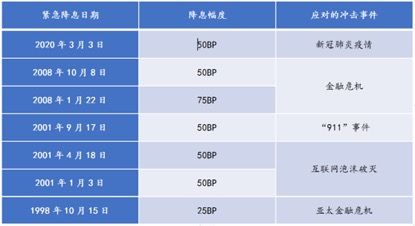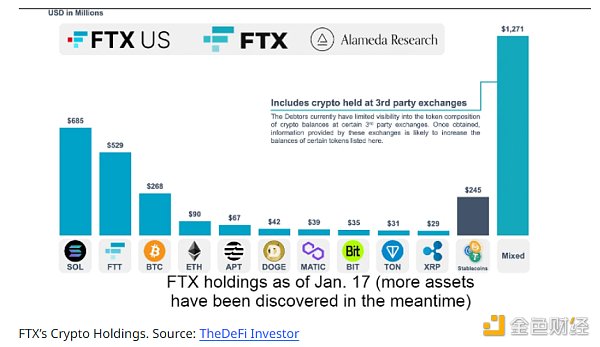Opinion | Traditional finance enters turbulent cycle, Bitcoin and financial bubble will start the first historical confrontation
Author: RMB City, a small sister
History does not crawl slowly, but suddenly jumps from one fault to another, with few twists and turns, but we only believe in small evolutions that we can predict.
-"Black Swan" Taleb Maybe years later, looking back, March 3, 2020, just now, is such an era fault worthy of being included in the history of international finance.
On the evening of March 3, Beijing time, the Federal Reserve announced a sudden emergency rate cut of 50BP during non-interest-rate meetings.
- Is it time to buy the bottom? Tether has added 60 million USDT inventory
- Ethereum 2.0 client Prysm interacts with Lighthouse, multi-client testnet release is a step closer
- Deputy Governor of the Bank of Japan: The issuance of the central bank's digital currency requires attention to "three constants" and "three changes"
This is a very unusual move. The last time the Federal Reserve's "urgent rate cut" went back to the time of the US subprime mortgage crisis in October 2008 was 12 years ago.
And know that usually no good things happen after an "urgent rate cut."
Several emergency interest rate cuts in history occurred after the collapse of the US subprime mortgage crisis in 2008, after the collapse of Lehman Brothers, after the terrorist attacks of September 11, 2001, and the bursting of the technology stock bubble, and the Asian financial crisis in 1998.

It can be seen that each emergency interest rate cut means an outbreak of a global financial event, and this rate cut is clearly directed at the black swan incident of the epidemic. The underlying reason behind this is the arduous global debt crisis.
As we all know, the global quantitative easing that has been going on for 12 years has accumulated and covered too many problems, and the epidemic is nothing more than a straw that completely crushed it.
From the perspective of global debt, a large liquidation may be about to begin. For us, under the storm, there are also opportunities in the challenges.
A decade-long bull market in U.S. stocks is completely ended
If you want to smell the storm, the US stock market is the most suitable.
I have spent more time in the United States these years. I deeply realize that the stock market is as important to Americans as the property market is to the Chinese.
A very large proportion of the American people's pensions are placed in the stock market, which determines the balance of the pension account after Americans retire.
At the same time, most assets of American middle-class households are also invested in stocks and funds. The stock market determines the quality of their daily lives.
American companies have to buy their own stocks even if they are in debt. The stock market determines the profitability of American companies.
Therefore, compared to the Chinese property market, the US stock market covers a much larger proportion of the population. If the Chinese property market is only a part of the game for the rich and the middle class, the US stock market is a game for all Americans.
The 10-year slow bull in the US stock market has formed an expectation that the US stock market will rise forever and life will always be good. The United States is most worried that this positive expectation will be ended.
After this emergency rate cut, the recent performance of U.S. stocks is still difficult to stop, just even the first meltdown of U.S. stock index futures since 2008, and the ten-year bull market of U.S. stocks has almost ended.
U.S. Treasury yields break new record lows
The impact of US 10-year Treasury bonds on global finance is significant because it is the anchor of global interest rates.
When the 10-year U.S. Treasury yield fell below the historical low of 1% on March 3, it was even the lowest point in 200 years, which caused a panic in public opinion, and even fell below March 9 0.5%, the speed is amazing, and there is a trend towards zero yield.
Generally, if the US economy improves, the return of various investment products will increase, and the yield of US debt will also increase;
At present, it is clearly the opposite direction.
This has very clearly reflected investor concerns about the vulnerability of the global economy and financial markets.
Traditional financial assets collapse, global finance enters turbulent period
Not only U.S. stocks and U.S. Treasuries. In the past ten days or so, in addition to the safe-haven asset gold remains strong, all other varieties in the global financial market have collapsed.
In today's tightly connected global finance, no asset or country can stand alone.
Perhaps in the future, we will call this economic crisis the "epidemic crisis", but the younger sister is more inclined to think that it is the inevitability of the 12-year quantitative easing policy in developed countries such as Europe and the United States. result.
After the 2008 U.S. subprime mortgage crisis, the U.S. borrowed frenziedly through quantitative easing, which forced the impact of the U.S. subprime mortgage crisis. But at the same time, it will inevitably blow up a huge asset bubble in 12 years and engulf the world.
The US Federal Reserve tried to stop the process of continuing to blow bubbles in 2015 by shrinking the balance sheet, but after the tremendous pressure of the US political economy and Trump's repeated shouts, it had to stop shrinking the balance sheet in 2018. It was the fastest-paced release of water in history in 2019, and the trillions of dollars injected in crazy continued to blow the asset bubble even larger.

When a balloon has been blown big, there are only two options:
Stop blowing and let the balloon gradually collapse (this will lose a lot of short-term practical benefits, as well as the future of politicians);
Or, keep blowing until it blows out (that is, continue this dangerous state and pile the problem into the future).
The United States obviously chose the latter. The emergency interest rate cut made more and more people feel that they are getting closer and closer to the bubble burst. This is why the US stock market plummeted after the interest rate cut policy came out.
Where does the money go?
In the current market, funds have lost the viable investment direction, so they can only evade risks urgently and collectively buy government bonds to seize the only safe investment in this traditional thinking.
After the short-term risk aversion, some funds will continue to be transferred to seek the best balance between risk and return.
So where will the funds flow in the future?
In the coming financial turmoil, asset preservation and hedging will always be the main theme.
The three principles of safe-haven assets are "global circulating assets, widely accepted globally, and not controlled by any single country."
Obviously, gold is still a good choice. Although gold has also plummeted, the overall increase is still not small, which is already a good proof.
Another important option that meets these three hedging principles will be Bitcoin.
Many people like to consider bitcoin as digital gold. They believe that bitcoin is more scarce than gold and has the characteristics of decentralization. Therefore, many people divide bitcoin into the same reserve assets and hedges as gold. assets.
If bitcoin is now called a safe-haven asset, it is still a bit far-fetched, because the volatility of bitcoin's price is too violent, which will make low-risk funds timid.
But what if it is only allocated in small amounts as a supplement to hedging assets, or just as a risk hedging tool in the asset portfolio? In the current context of interest rate cuts and quantitative easing, this has obviously become increasingly feasible.
Not surprisingly, 2020 is likely to be a year of dramatic change for institutional investors. A debt crisis will allow traditional investors to start to write digital currencies into their asset portfolios as a reserve asset, instead of just treating it as a risky investment.
Nobel laureate Paul Krugman is even sharper, saying:
"Gold is dead, Bitcoin is more practical than gold, and there is more room for appreciation in the future."
Coinbase CEO Brian Armstrong made similar comments, saying that:
"The slowdown in the global market economy will force the central bank to take more extreme market stimulus measures in the coming months, which is likely to benefit crypto assets. Increasingly aggressive policies will devalue the fiat currencies of various countries and harm the interests of depositors. At the same time, it makes scarce assets like Bitcoin more attractive. "
The battle of the era of Bitcoin is not overnight
In the near term, in addition to the performance of gold, digital currencies represented by Bitcoin have also fallen with other asset classes, and have not shown much unique trends.
The younger sister felt that such a performance was not unexpected.
After all, trying to judge the short-term market of digital currency is tantamount to throwing dice.
Any negative news, a huge whale hitting the plate, or even a rumor may make the trend in the short term fluctuating greatly. Especially after leverage, futures and other derivatives replaced the spot to become the mainstream, the sudden rise and fall of the forces of all parties to pull back and forth has become commonplace.
So why do I never recommend "frying coins"? The "frying" action is very contingent. No matter whether the short-term market price rises or falls, it does not matter from a long-term perspective.
In contrast, the long-term trend of Bitcoin is very clear and clear, and it can be effectively judged through logical analysis.
With its 11-year history, Bitcoin proves that all those who have long been optimistic about it have received returns that are beyond imagination. So early participants will form what is called "faith," and I believe it will remain so for the next ten years.
The "war of the times" between Bitcoin and traditional finance has just begun. This is a protracted battle, and it is by no means a one-off victory.
Only by looking at the long-term trend, can we not be obscured by short-term fluctuations. As long as you are not using leverage to make futures, the recent decline of 2,000 points is only a small ripple in the long run.
In addition, digital assets have not been incorporated into the mainstream asset allocation of global investment institutions on a large scale. Therefore, the interest rate reduction effect cannot be quickly transmitted and reflected in the market. It will also cause Bitcoin to have a limited response to interest rate cuts in the short term. The real positive impact will surely gradually emerge in the future, and there is not much suspense.
As the saying goes, good things don't go out, bad things go a long way. The positive effects are transmitted slowly, but the panic can instantly permeate the entire financial world. Air Forces who want to be “big bears” will not miss this opportunity. They raise their sickles and start to fall with their hands, and the contract market will shed blood.
Every crisis is a redistribution of wealth
History always repeats itself. The financial crisis and inflation always appear periodically. Our response has always been nothing more than currency issuance and liquidity release.
Such a strategy can indeed increase economic vitality and save a group of companies. But for a large number of ordinary people, the result of each round of crises can only be a real decline in wealth.
So who would be those few exceptions? Obviously those who understand the laws of finance.
After all, finance is also a game of constant wealth distribution. When each financial crisis comes, the speed of wealth transfer will reach its peak.
There are dangers, and every crisis that occurs is a redistribution of wealth, both to individuals, to businesses, and to the country.
As far as the country is concerned, judging from the emergencies such as the epidemic and the economic development trend over the past decades, China has fully demonstrated the unique advantages of the national system. I believe that our country will have a stronger future for the possible black swan or financial crisis. To cope with confidence and ability to minimize losses.
For individuals and enterprises, how to grasp the value development trend of various assets during crises and turbulence, and to preserve or even greatly increase their wealth in the reorganization of asset values, is a topic that everyone needs to think deeply.
Why is Bitcoin born?
Satoshi Nakamoto left a meaningful sentence in the Bitcoin genesis block:
The Times 03 / Jan / 2009 Chancellor on brink of second bailout for banks. (On January 3, 2009, the Chancellor was on the verge of implementing the second round of emergency bank assistance.)
And today's scene happens to be so similar.
Let everyone's wealth be protected more fairly. This should be the original intention of Satoshi Nakamoto to create Bitcoin.
The bull market of digital currency occurs about 3-5 years, and the global financial crisis occurs about every 10 years. This time, the two coincidentally coincide, so in 2020-2021, we will most likely witness a rare scene where the two are superimposed.
The public's panic is an opportunity for a few people.
For the first time in the history of digital currency and financial crisis, we may jump out and think seriously. Is it betting on the traditional financial world or emerging digital assets? Seizing the opportunity to rationalize the layout of your assets will make it possible to preserve wealth in this financial turmoil and even overtake the curve.
A fortune shuffle is about to start. Are you really ready?
We will continue to update Blocking; if you have any questions or suggestions, please contact us!
Was this article helpful?
93 out of 132 found this helpful
Related articles
- 4% to 10%, 900 to 8000, the goddess of industry interpreting the blockchain over the years
- The broad market rebounded close to $ 8,000, and the short-term bulls are still weak
- U.S. lawmaker proposes new cryptocurrency bill: clear regulatory body to bring legitimacy to crypto assets
- Babbitt Interview | How Cryptocurrencies Change the World? We talked to the columnist of the international station
- $ 2 billion stock repurchase agreement reached, Bitcoin advocate Jack Dorsey will stay on Twitter as CEO
- Blockchain Weekly Report | Bitcoin drops near mining unit prices again; 13 listed companies disclose blockchain business
- Talking about the application scenario practice of blockchain-copyright protection and transaction






